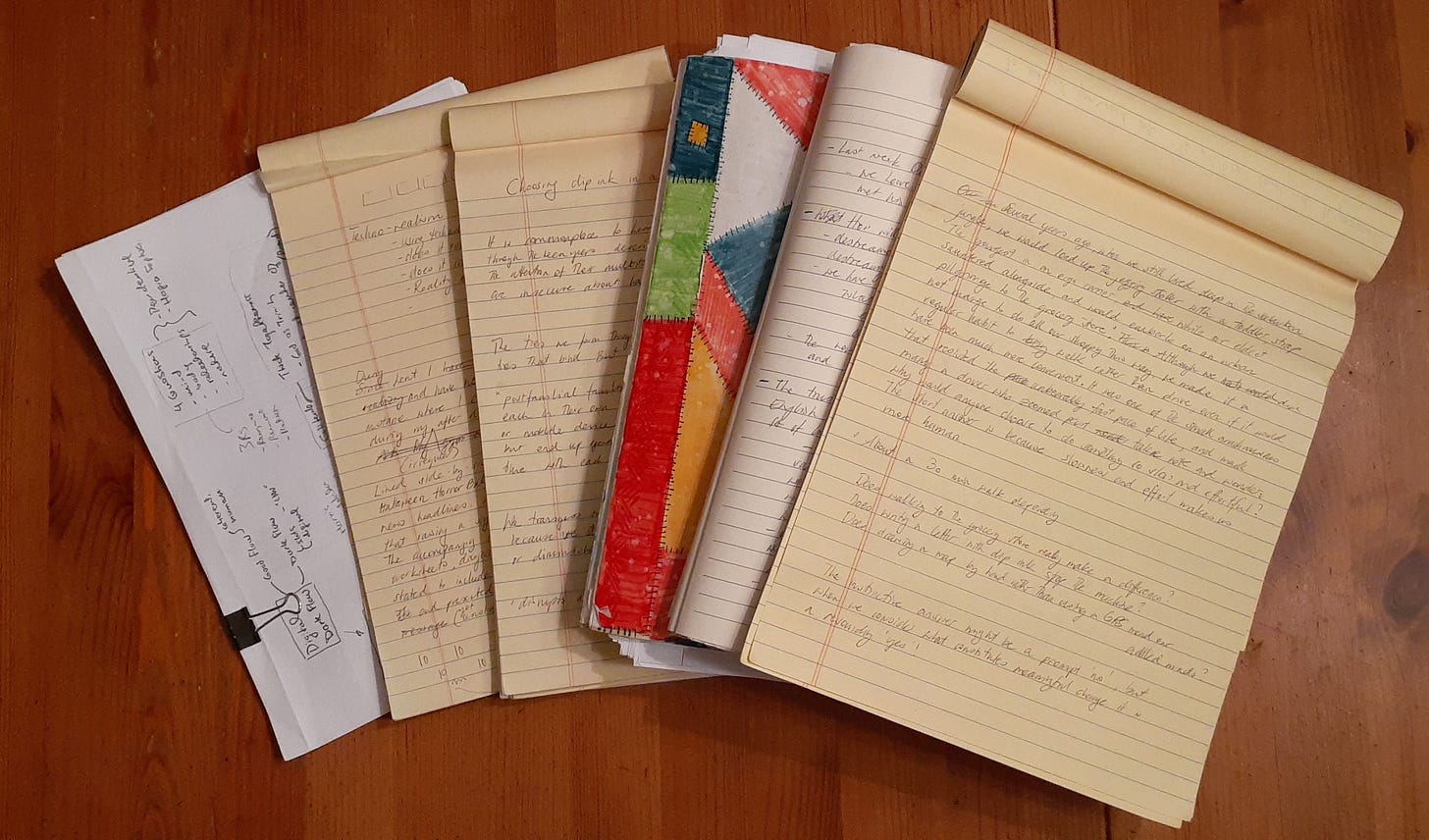Nothing vast enters the life of mortals without a curse. – Sophocles
I wouldn’t normally write an article on a Sunday evening when I really ought to be lounging on the couch with a mug of green tea, but something’s come up and it can’t wait.
Anyone who’s written an article on Substack knows how much time it can take, between the idea, the research, the writing, the editing, and the photos or artwork. I’m fortunate because I often work together with my Susbtack partner (and wife,
), but even so, the process is slow, and consumes much free time that might have been otherwise usefully spent with my children, reading, folding mountains of laundry, or cleaning out the straw in the chicken coop.This particular Sunday evening, as I casually pondered ideas for my next article, I discovered a new app on Google for creative content generation. We’ve all heard about AI platforms that generate creative text outputs, like essays and stories, but I hadn’t yet heard about NotebookLM, which can do something remarkable: create podcasts out of uploaded text.
About a year ago, Ruth and I published an article on the 3Rs of Unmachining, which is about how to manage digital technology in our lives through the three basic principles of Recognizing the harms of technology, Removing unwanted tech from our environment, and Returning to more human ways of living.
The 3Rs was one of our most popular pieces.
So out of curiosity I uploaded the PDF for this 4000-word article into Notebook LM, and then I went for a quick bathroom break. By the time I’d flushed the toilet and returned to my computer (I think there’s some weird symbolism in that), NotebookLM had produced a lively 8-minute podcast in which two hosts, a man and woman, discuss the article. There’s bantering, reflection, little expressions of surprise, clever turns of phrase, and all sorts of other things you might expect when two people are chatting online about a cool idea.
I was floored. I played it to Ruth, not letting on where the podcast had originated. She was curious how the hosts had come across our writing and asked what show it was. When I revealed that this was created in a couple of minutes by an AI program, she was repulsed (I think she actually said “That’s disgusting!”).
If you want to give it a listen, here it is. Remember, this took about 120 seconds to make. The voices are all AI.
How ironic that two machine-generated entities are talking about strategies for being more human in a machine world. At the 4:04 mark the male AI host even recalls a childhood memory, and at 4:49 talks about how he wrote his grandmother a letter this week rather than texting. You can even hear him take an in-breath at 6:46.
Sure, if you know ahead of time that the voices are AI, you can start to pick up the shimmers of unreality. It’s all a bit too polished, a bit too clean. But I’m confident that our friends at Google will figure out how to rough up the edges in a year, or maybe by tomorrow, and make it so realistic that it will not just pass the Turing Test but smash the Turing Test.
And it could also smash the creator’s economy.
Just as unskilled writers can get AI to produce passably good writing, NotebookLM is an easy way to create marketable podcasts with almost no human effort.
If you’ve spent any time at all on Substack, you soon notice that some authors can publish a couple of times a week. If you’re a decent enough writer (or podcaster), that might be enough to attract a following and generate a small income stream for your hard work. You probably won’t get rich, but it’s a nice reward for the toil.
AI content generation tools bring the risk of flooding the market with a lot of cheap goods that can undercut even the most productive human creators. And in the case of writers like myself—who publish fairly infrequently—the risk is greater. Invariably, the question that haunts me, and that ought to haunt all of us, is this: Why should anyone go through all the work to create a deep and eloquent essay or podcast, when somebody will use AI to do the same thing more eloquently and deeply—and in the same time it takes them to go on a bathroom break?
Some writers such as Ruth and I,
, , and several others, have taken a clear stand on rejecting the use of AI in all aspects of writing and creating. In a recent note Ruth commented:In Switzerland bakers in large grocery stores prepare bread in full sight, kneading, braiding, and scoring it by hand. Would it be faster and more efficient to do by machine? Yes. But they decided to uphold tradition because people care about provenance - it matters where things come from and how they were made. This is as true for bread as it is for words.
Language is what makes us human. Once you abdicate part of the writing process to a soulless machine you compromise your voice. As a reader I want to read words and ideas that have been woven and crafted by a human. If I know that AI was used in the process, not only do I lose all interest, but the writer loses credibility in my eyes.
For me this door is firmly shut. I draft all articles by hand, type them up, print them out, read them through together with my husband Peco, edit them by hand again. 100% human-made. (Even the logo for was hand-drawn by my then 10-year old son).

Substack is growing fast, yet the tools for creating the equivalent of Rolex knock-offs of its main products are growing even faster.
, , and : Substack needs to act on this issue quickly, if it wants to protect the authenticity of its content and safeguard the trust of its readership. Maybe we need to get authors to sign a declaration indicating whether they use AI in the generation of their content? Or maybe Substack can introduce an app to help detect whether an author’s works appear to have been AI-generated?I’m not suggesting that people who use AI shouldn’t be allowed to publish on Substack; rather, that without some form of intervention, the power of AI will undermine many people’s faith in the platform.
No matter how good AI gets, many of us will always want articles and podcasts created by human beings. You might call it “artisanal writing”, or “artisanal content”—though it’s also a bit ridiculous that we might have to label something to identify it as authentically human. Like putting on a sticker that says “Organic”, or in this case “Made by an actual Soul”.
Substack has effectively upheld the freedom of speech. Now the question remains, will it also stand up to protect uniquely human speech?
The AI curse is coming. Are we ready to safeguard the creator’s economy?






